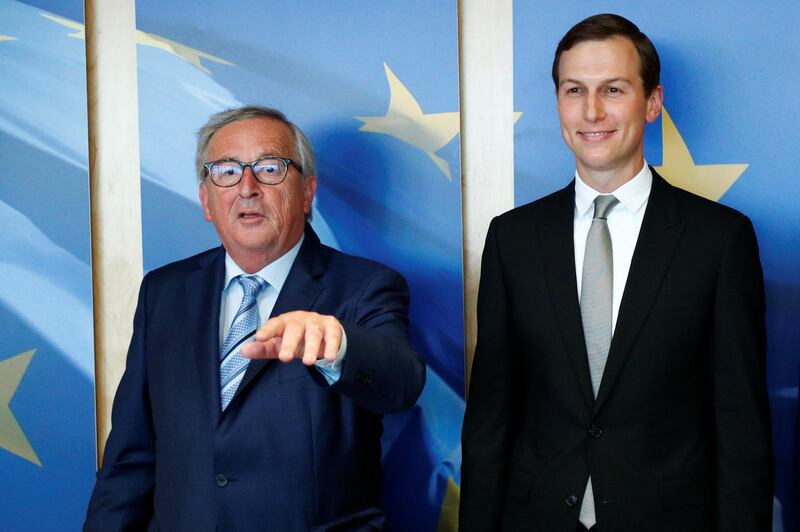European Commission President Jean-Claude Juncker has urged the United States to respect the needs of both Israelis and the Palestinians in any future Middle East peace moves.
Mr Juncker's office said that in a meeting on Tuesday, President Donald Trump's son-in-law Jared Kushner shared some of the administration's thoughts about the way ahead in the region.
EU foreign policy chief Federica Mogherini also attended the meeting, called at Mr Kushner's request.
The EU officials listened to Mr Kushner's "ideas and underlined the fundamental interest of the European Union for a lasting and sustainable peace and stability in the region".
They say "the economic development of the whole region is crucial. It must be accompanied by viable political progress that takes into account the aspirations of both the Palestinians and the Israelis."
Mr Trump, whose administration has staunchly backed Israeli Prime Minister Benjamin Netanyahu, acknowledged doubts about the plan himself on Monday, while Mr Kushner suggested that Palestinians were not ready to govern themselves.
Asked whether he believed the Palestinians were capable of governing themselves without Israeli interference, Mr Kushner said: "That's a very good question. That's one that well have to see. The hope is that they, over time, will become capable of governing."
The Palestinians, he said, "need to have a fair judicial system ... freedom of press, freedom of expression, tolerance for all religions" before the Palestinian areas can become "investable".
The United States is to lay out an economic component of the plan, which has been spearheaded by Mr Kushner, on June 25 and 26 in Bahrain, where Gulf Arab states are expected to make pledges to boost the troubled Palestinian economy.
But it is not clear when the political aspects of the plan – which are expected to avoid calling for the creation of a Palestinian state – will be unveiled.
Abandoning the call for a Palestinian state would end years of US support for the so-called "two-state" solution, which envisages separate homelands for Jews and Palestinians.
The EU is still firmly behind the two-state solution with Jerusalem as capital of both states – in contrast to Washington, which has recognised the city as Israel's capital.
The Palestinians have rejected US mediation and are boycotting the Bahrain conference, saying Mr Trump is not an honest broker.
Mr Trump, whose evangelical Christian base strongly backs Israel, has broken precedent by relocating the US embassy to Jerusalem and recognising Israel's sovereignty over the occupied Golan Heights, captured from Syria in the 1967 Six-Day War.
Meanwhile, Israeli politics was upended last week when a snap election was set for September after Prime Minister Benjamin Netanyahu, a veteran conservative close to Trump, failed to form a coalition.
Another key broker in the peace process, the United Nations, says it will stay away from the Bahrain meeting.
In the remarks delivered Tuesday to the Conference of Presidents of Major American Jewish Organisations, US Secretary of State Mike Pompeo acknowledged the blueprint's perceived favoritism to Israel but hoped it would nonetheless be given a fair hearing.
"I get why people think this is going to be a deal that only the Israelis could love," he said, according to The Washington Post. "I understand the perception of that. I hope everyone will just give the space to listen and let it settle in a little bit."






